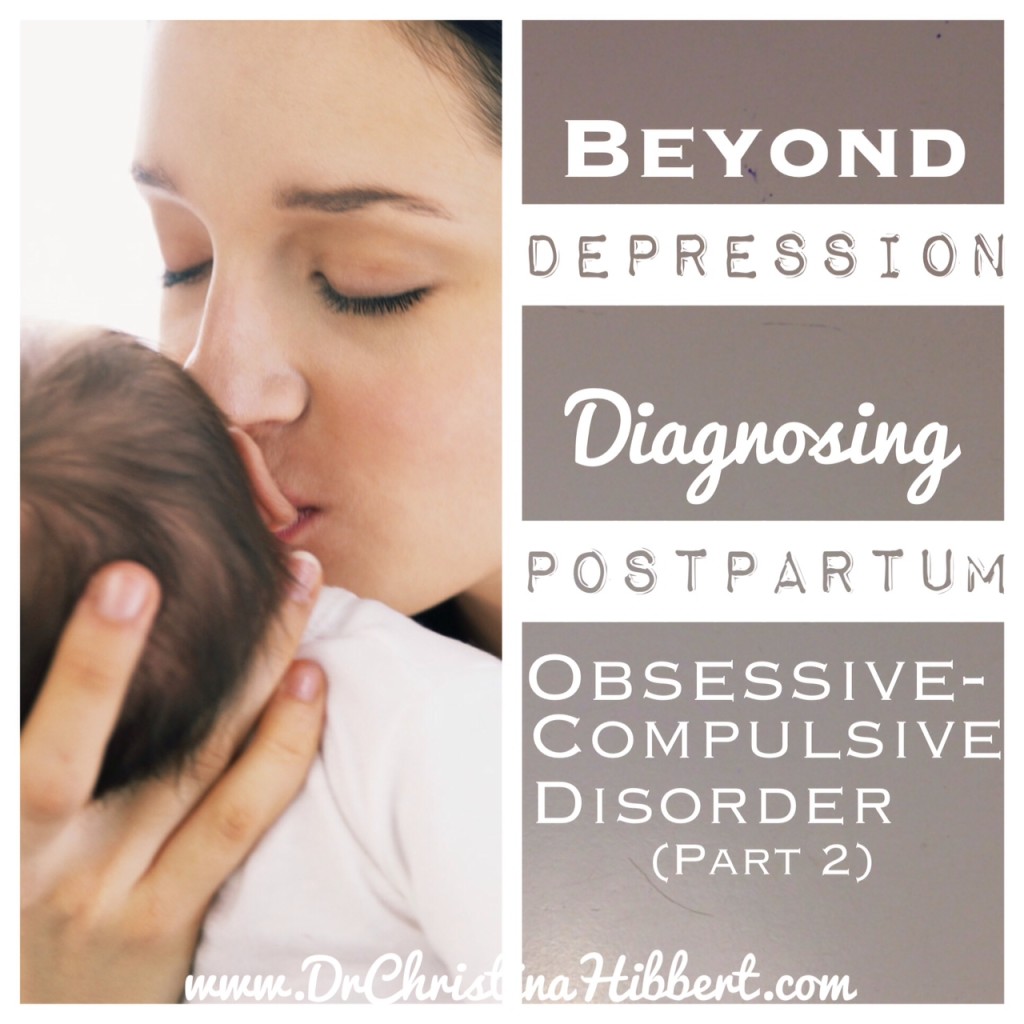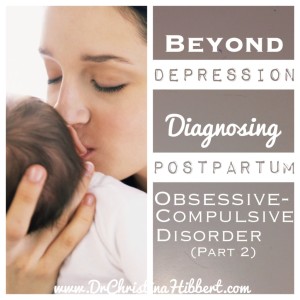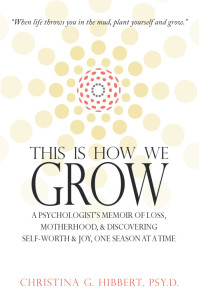
15 Mar Beyond Depression: Diagnosing Postpartum OCD–Part 2 (& video)
 In Part 1, we explained the symptoms of Pregnancy/Postpartum Obsessive-Compulsive Disorder (PPOCD) and what makes this disorder the most misunderstood of all the Perinatal Mood/Anxiety Disorders. (If you have not yet read Part 1, I suggest doing so before moving on.)
In Part 1, we explained the symptoms of Pregnancy/Postpartum Obsessive-Compulsive Disorder (PPOCD) and what makes this disorder the most misunderstood of all the Perinatal Mood/Anxiety Disorders. (If you have not yet read Part 1, I suggest doing so before moving on.)
In Part 2 we discuss the diagnosis of PPOCD, what makes it so tricky, and tips for families and providers to help mothers get the best possible diagnosis and care.
Postpartum OCD: The Most Misdiagnosed Disorder
Postpartum Obsessive-Compulsive Disorder is not only considered the most misunderstood disorder; it’s also considered the most misdiagnosed. Many people—even well-established medical and mental health professionals—confuse Postpartum OCD with Postpartum Depression (PPD), thinking these mothers are “just depressed,” and failing to recognize the extreme anxiety and duress these mothers and families are experiencing. Though treatment for PPD might help with the depressive symptoms, the misdiagnosed PPOCD mother often fails to get the treatment she needs to address the intrusive thoughts and reduce her anxiety.
Even more harmful, PPOCD is too often misdiagnosed as the more rare and potentially life-threatening Postpartum Psychosis (which affects 1 in 1000 mothers). In my 13 years as a psychologist and expert on pregnancy/postpartum mental health, I have witnessed the unfortunate hospitalization of several mothers experiencing postpartum OCD. Misdiagnosed with Postpartum Psychosis, these mothers were seen as a threat to their infants and subsequently hospitalized in behavioral health units, placed on antipsychotic medication, and separated from their infants—many for up to a month or more. Most were also told they must stop breastfeeding, and some were reported to Child Protective Services.
The damage done to these mothers–and their husbands, infants, and families–is, understandably, heartbreaking. Only once they were released and began to research their symptoms did they learn about Postpartum OCD. They were eventually able to find me, or another expert on Perinatal Mental Health, and receive the proper diagnosis and treatment, including a referral for the right kind of medication, and psychotherapy.
This is why I am writing this article—because medical and mental health providers, and families, need education on perinatal mental health if we are to prevent the unnecessary suffering of so many mothers, babies, and families.
Why is PPOCD so often Misdiagnosed?
Having trained hundreds of providers over the past nine years as Founder of the Arizona Postpartum Wellness Coalition, I’ve learned a few things about why PPOCD is so misdiagnosed:
1) These are usually well-meaning providers who are trying to do the right thing. They simply lack important information, education, and/or clinical experience to make the right diagnosis. Unfortunately, some have never even heard of Postpartum OCD.
2) Providers want to protect the baby, and rightly so. Keeping babies safe is obviously a top priority, as it should be. Unfortunately, providers hear “thoughts/images about harm coming to the baby,” and they panic. They immediately fear the mother may be a threat to her child, so they act in order to protect the baby without taking the time to research, assess thoroughly, and consult.
3) However, protecting the mother is part of protecting the baby (I think most providers would agree). Babies need healthy, strong mothers who are receiving the best treatment to help them get well soon. With proper training, education, and diagnosis, we can protect both babies and their mothers. We can heal families and not cause more harm.
Diagnosis: Postpartum OCD vs. Psychosis
Watch this 3-Minute Therapy video, “Beyond PPD: Diagnosing Postpartum OCD,” on my YouTube Channel, and watch Part 1 video, “Beyond PPD: Understanding Postpartum OCD” here. Then, please continue reading, below.
[stream provider=youtube flv=http%3A//www.youtube.com/watch%3Fv%3Dve9MghsJLNc img=x:/img.youtube.com/vi/ve9MghsJLNc/0.jpg embed=false share=false width=640 height=360 dock=true controlbar=over bandwidth=high autostart=false responsive=16:9 /]
Following is a list of the distinct differences between Postpartum OCD and Psychosis. Understanding these differences can help families and providers distinguish PPOCD from Postpartum Psychosis to help make the correct diagnosis. Please note: This is article is merely for educational purposes, however, and should never replace true medical/mental health assessment and care.
Postpartum OCD:
- Thoughts are in the mind–they are non-psychotic, intrusive thoughts. This means the woman is still “in reality,” and the thoughts come from her mind and not her outside environment. She does not want the thoughts to come. They intrude upon her.
- Women recognize thoughts/images are unhealthy. They are highly aware these thoughts are not “okay,” and they may work very hard to try and stop the thoughts from coming (hence the compulsive behaviors).
- Extreme anxiety related to thoughts/images. These mothers are worried, stressed, and fearful of the thoughts. They experience great distress because of them.
- More gradual onset and brief duration. Sometimes OCD starts in pregnancy, then continues and perhaps intensifies postpartum. Other times it starts days, weeks, or even months after the baby is born. Episodes tend to last for seconds or minutes, though the aftereffects (like anxiety) can last much longer.
- Overly concerned about “becoming crazy.” They will research and ask loved ones/providers, over and over, “Are you sure I’m not going crazy?” This only proves they are well-aware of what they are experiencing, and not at all out of touch with reality.
Postpartum Psychosis:
- Thoughts are psychotic in nature—including delusions (false beliefs) and/or hallucinations (hearing/seeing things). This means the mother is experiencing a break with reality.
- Women do not recognize actions/thoughts are unhealthy. Psychotic people do not know that what they are saying/doing are wrong, scary, or in anyway abnormal.
- May seem to have less anxiety when indulging in thoughts/behavior. Psychotic people typically seem to feel less anxious the more they indulge in their psychotic thoughts/behaviors. Their affect is usually very flat, with a detached, spaced out sense about them.
- Acute onset—a sudden noticeable change from normal functioning. Postpartum Psychosis usually occurs quickly, often in the first seven days postpartum. Symptoms come suddenly, and family members often describe a sudden, distinct difference in behavior and personality.
- Thoughts are longer in duration and more all-encompassing. Psychotic episodes may last for hours or days, and it’s as if they take over the person, as if she is not herself.
- Thoughts come from the environment. She may have thoughts in response to people/situations around her, wheras PPOCD mothers’ thoughts intrude into their minds and are not a result of their outside world.
Final Important Things To Know about Diagnosing Postpartum OCD
My intention with this article is to open the door to greater awareness and education about PPOCD, so we can help mothers, babies, fathers, and families get the diagnosis and care they need and deserve. Again, this article is in no way intended to replace medical/mental health care, though I hope it might enhance it.
For Mothers & Families:
- Postpartum OCD is highly treatable, and there are some excellent providers out there who can help you with what
 you need.
you need.
- Postpartum Support International (PSI) is the best resource to help you find the proper provider for you. They also provide phone support and advocacy, so please contact them for help. I have been a member, volunteer, state coordinator, and board member with PSI over the past 15 years, and I can attest that they are the best postpartum resource around.
- Remember to keep trying until you find the provider that is right for you. It’s not only okay to seek a second (or even third) opinion, it is recommended if you feel you’re not receiving the proper care.
- Involve your partner/husband/mother/family in your care, too. This will help you feel like you have a team supporting you and will help you keep at it until you get the right care. (More on treatment of OCD to come in Part 3, so Subscribe, below, or check back soon. Also, check out my Postpartum Depression Treatment series for more on overall treatment options.)
For Medical/Mental Health Provders:
- If you work with pregnant or postpartum women, learn all you can about Pregnancy/Postpartum Mood/Anxiety Disorders, especially PPOCD. PSI provides excellent education and can also link you up to local and online educational courses, like those we do through The Arizona Postpartum Wellness Coalition.
- Connect with others in this field, and consider joining PSI. Attend their annual conference and others like it, for more in-depth education on perinatal mental health. I’ve been attending for 14 years, and they are incredibly informative every time.
- Most importantly: If you feel uncomfortable diagnosing PPOCD on your own, seek consultation or supervision. If you can find a perinatal mental health expert in your area, consult with them, or refer your client to them, if that feels like the best option. Call and explain your concerns, discussing them together. This is the best way to ensure you are keeping both baby and mom—and the whole family—safe and well.
- Another important factor in making the right diagnosis is involving the mother’s husband/partner and family in the assessment. Ask them how she has been and how they feel about her. Involve them in helping you monitor her symptoms and getting her to other providers for treatment, as needed.
This is such an important topic, and one I fear gets far too little attention. So, join me–let’s start this discussion, and keep it going. Let’s get talking, so our mothers, fathers, families, and healthcare providers will understand Postpartum OCD. Let’s get educating so our postpartum families will no longer have to suffer in silence–so they will receive the concern, help, and care they so rightly deserve.
Read Part 3 of this “Beyond Depression” series, on Postpartum OCD & Treatment.
Read Part 1: “Beyond Depression, Part 1: Understanding Pregnancy/Postpartum OCD“
I’ve received more feedback, messages, emails, and discussion on this topic than any other, ever, on my site. If you have something to say about this, I would like to hear it. Please leave a comment, below, with your thoughts/questions/concerns. Let’s get and keep this important dialogue going.
Be sure to check out Dr. Hibbert’s Amazon Bestseller, This is How We Grow–
available now on Amazon.com!
Join my This is How We Grow Personal Growth Group!
FREE. Online. Growth. What more could you ask for?
Don’t miss a thing!
SUBSCRIBE, below, “like” my Facebook pages (Dr. Christina Hibbert; This Is How We Grow) and follow me on Twitter,Pinterest, & Instagram!
You may manage your subscription options from your profile
Related Articles/Posts:
Beyond Depression: Understanding Pregnancy/Postpartum OCD (Part 1) (& video)
Beyond Depression: Postpartum OCD Treatment (part 3) (& video)
Pregnancy & Postpartum Emotional Health
Postpartum Depression Treatment
Postpartum Depression Treatment: For Dads & Partners
Postpartum Depression Treatment: For Couples
Postpartum Depression Treatment: Complementary Alternative Modalities
Postpartum Depression Treatment: Psychotherapy
Postpartum Depression Treatment: Medication
Postpartum Depression Treatment: Self-Help
Postpartum Depression Treatment: Sleep
Postpartum Depression & Men: The Facts on Paternal Postnatal Depression
16 Things I’d Like My Postpartum Self to Know, 16 Years & 6 Kids Later (PSI Blog Hop)
Moving Beyond Shame: The Ultimate Power of Support & Time (PSI Blog Hop)
Pregnancy & Postpartum Mood & Anxiety Disorders: Are Women of Advanced Maternal Age at Higher Risk?
In Praise of Fathers: 10 Research-Based Ways Dads Impact Kids for the Better
5 Reasons Self-Esteem is a Myth
How to Feel Self-Worth: “The Pyramid of Self-Worth”
Thought Management, Part 1: The Relationship between Thoughts, Feelings, the Body, & Behavior
Womens’ Emotions & Hormones– Series
Achieving Balance–Why You’ve Got it Wrong, & How to Get it Right
Pregnancy & Postpartum Loss, Grief, & Family Healing (Part 1)
How to Cope with and Treat Perinatal Loss & Grief (Part 2)
Pregnancy/Postpartum Resources & Help:
Postpartum Support International Website (Worldwide help and support for new mothers and families, including a bilingual hotline and state/country coordinators to help you find the right treatment provider or support in your area.)
Postpartum Progress Blog (Excellent source of education and support for mothers and families)
Pregnancy & Postpartum Resources
Arizona Postpartum Wellness Coalition (AZ Support Groups, Events, Education)
Postpartum Stress Center (Education for Providers and Families)
References:
Facts for this article were taken from The Arizona Postpartum Wellness Coalition‘s 2-Day, research-based course, Perinatal Mood/Anxiety Disorders: Assessment & Treatment, and my 1-Day, research based course, Perinatal Mood/Anxiety Disorders: Advanced Clinical Skills. For more on these programs, please visit www.postpartumcouples.com or www.azpostpartum.org, or email me. For more on PPOCD and links to research, please visit www.postpartum.net.
**This article is not intended to replace proper medical/mental health care. If you think you may be suffering from Postpartum OCD, please contact your medical or mental health provider, or PSI, for referrals/help/support.**

